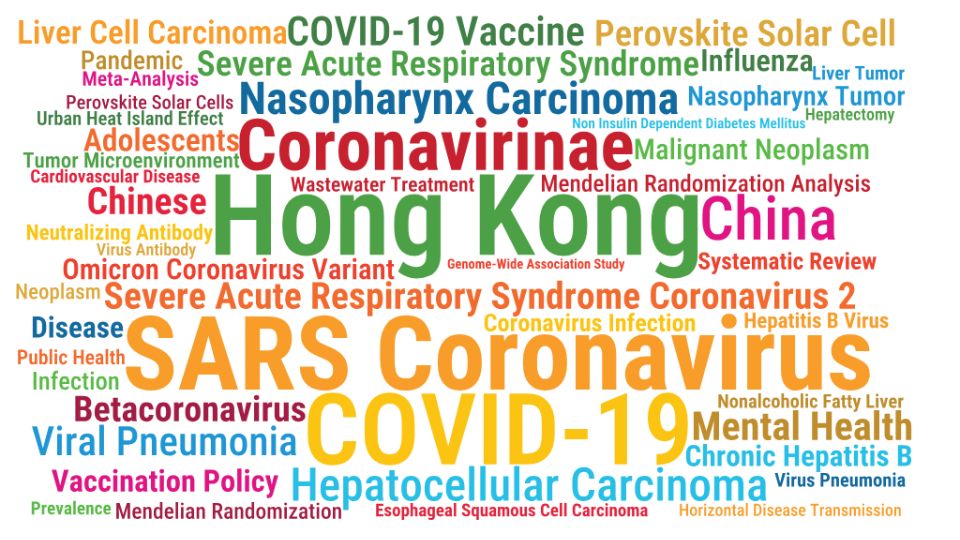Category: HKU Research

In the Front of Research: Newly Emerged Topics for 2024 and HKU Contributions
— by Vivian Qiu 1. Introduction 1) Research fronts A research front can be conceptualized as the convergence of scientific discoveries and societal interests, with new findings leading to further discoveries [1]. Understanding research fronts can help researchers identify key areas for future exploration, thereby enhance the capability of researchers to contribute meaningfully to their disciplines and…
Read More
Viewing HKU Research Through the SDG Lens
— by Chloe Ng Continuing from our previous blog posts1 in presenting HKU’s research contributions to the Sustainable Development Goals (SDGs), this year’s post tracks HKU research performance across the 16 SDGs2 during 2019-20243, and explore changes in individual SDGs and topics over time. HKU Publications Contributing to Sustainable Development Of the 48,284 scholarly outputs…
Read More
Flourish: Visualizing Data in an Easy and Engaging Way
— by Vivian Qiu Flourish is an online data visualization tool that can help turn complex datasets into engaging and informative visuals in an easy way. In this blog post, we will introduce what Flourish could do for you, its advantages and how to use it. 1. What is Flourish Flourish empowers users to transform…
Read More
A Comparative Approach to Explore HKU Publication Trends Using Data from OpenAlex and Peer Databases
— by Vivian Qiu, Florence Ng The accelerating adoption of open science practices has driven the emergence of digital tools or platforms that enable openness in research. These tools greatly enhanced the accessibility and transparency of scholarly publications and relevant data. In our previous blog post released in 2022, we introduced OpenAlex, an open catalog…
Read More
Visual Discovery Tools for Digitized Primary Sources: Gale Primary Sources
— by Y. Y. Kwan Primary sources are original historical documents from the past. Many primary sources are available in digitized format today, including Gale Primary Sources, the online platform of the US publisher Gale. HKU Libraries has access to over 30 historical archives from Gale covering various time periods and types of material, including…
Read More
Top HKU Researchers in Research.com Rankings 2024
— by Yijing He, Zesen Gao, Florence Ng The University of Hong Kong (HKU) takes pride in its distinguished scholars and researchers who excel across various fields of expertise. In our previous blog post, we reported a brief analysis on how HKU researchers were named in 2022 on an educational platform Research.com. This year, Research.com…
Read More
Research tools to analyze Chinese language texts
— by Jacky Li Digital humanities has become increasingly prominent in recent years with significant resources being invested in digital preservation and large-scale applications for digital humanities projects. Although it does not necessarily lead to a paradigm shift in humanities studies, as traditional research methods have their accumulated values and numerous academic achievements, digital humanities…
Read More
Event Summary – Unlocking Research Potential: Effective Data Management for Transdisciplinary Success
— by Chloe Ng The “Unlocking Research Potential: Effective Data Management for Transdisciplinary Success” sharing session successfully took place on Zoom on 12 March 2024 as part of the Research Data Academy series. The Ph.D. student sharing session was co-organized by the i-REACH project, Advanced Technologies Institute of HKU, Sau Po Centre of Ageing of…
Read More
HKU Contribution to Sustainable Development: Committed, Comprehensive, and Crucial
— by Chloe Ng The 2030 Agenda for Sustainable Development (United Nations, 2015) provides a shared roadmap for achieving sustainable development by year 2030. Central to this agenda are the 17 Sustainable Development Goals (SDGs), which emphasize the need for global partnership to address pressing challenges and create a better world for present and future…
Read More
Select the Citation Management Tool That Best Suits Your Needs: EndNote vs. Zotero
— by Cheryl Lee Citation management tools can greatly help researchers organize, store, and cite references, saving valuable time for your academic research. This blog post will introduce two popular citation management tools, EndNote and Zotero, to provide you with some ideas so that you can select the one that best suits your learning and…
Read More